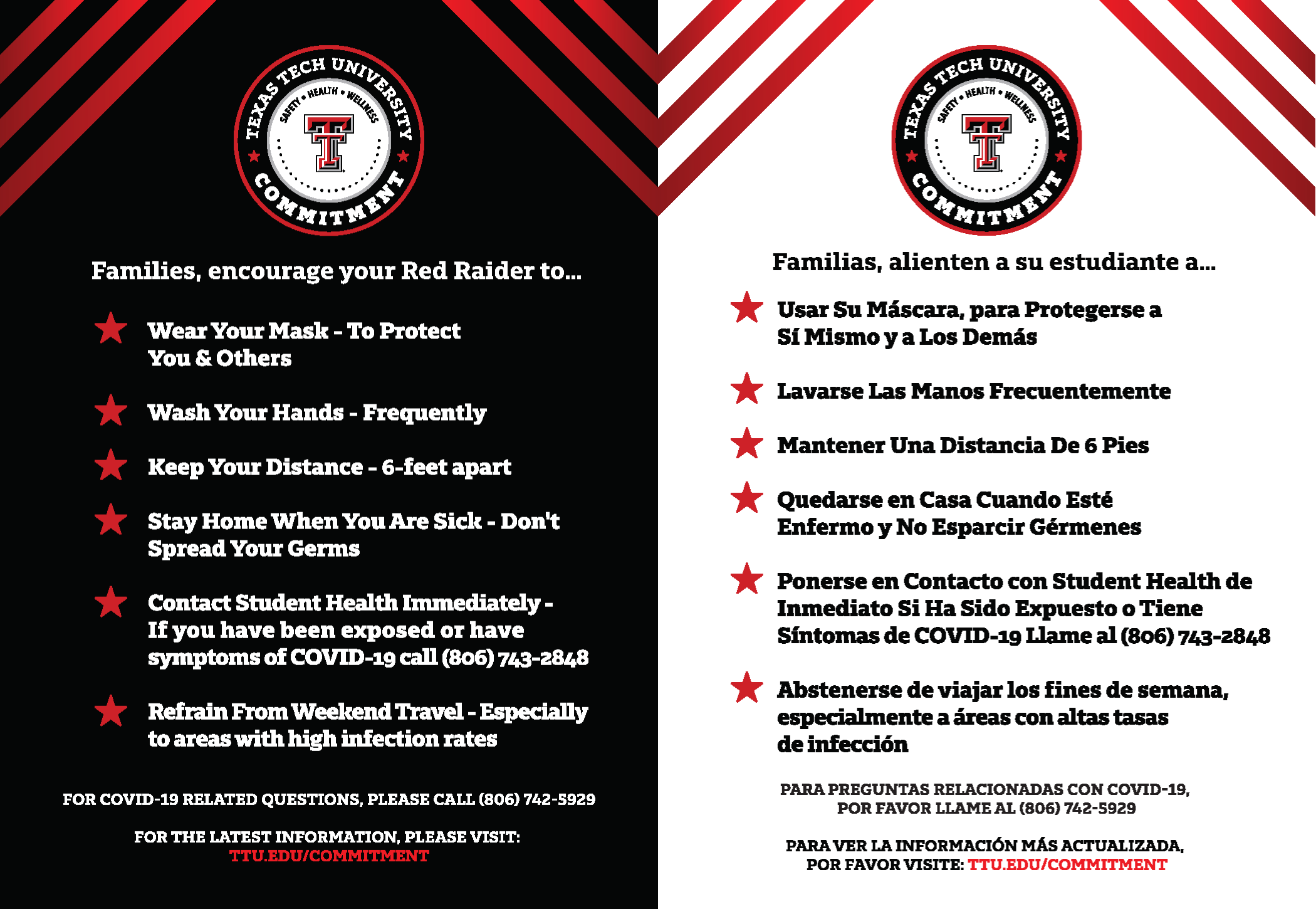Tips and Resources for Parents & Family Members
Texas Tech University will continue teaching and learning for the spring 2021 semester utilizing a blend of face-to-face, hybrid (combination of face-to-face instruction and online learning), and online modalities. Course modalities will remain flexible with more than two-thirds of our courses being taught using some degree of face-to-face instruction. Please visit the Texas Tech Commitment website for the most up-to-date information.

Students will have online courses or hybrid courses. They have likely already had some experience with this type of learning environment but may need additional support for online learning. Below is an explanation of these courses and how students may be experiencing learning.
- Hybrid courses include a combination of online and face-to-face lectures and/or activities. There
are several types of hybrid courses, but the three most popular are:
- Traditional hybrid: students typically meet face-to-face at least once a week and the instructor lectures during this time. For the additional class time, students will be engaged with a variety of learning assignments/activities that will be completed online. The assignments/activities will reinforce the content covered in the face-to-face lectures.
- Flipped class: students review materials (e.g., recorded lectures, topic-related videos, readings) prior to the face-to-face meeting. During the face-to-face time, students are engaged in learning activities directed by the instructor.
- Hyflex (Alternating or Flexible Hybrid): a group of students are face-to-face in a classroom, and another group of students are in a different location (e.g., at home, or one of Texas Tech's regional sites). This type of hybrid class allows an instructor to use the traditional lecture while providing the flexibility of attending class from off-campus locations.
- Online Class Delivery
- Asynchronous: This is an online course that allows students to log into Texas Tech's Learning Management System (Blackboard) anytime during the day to access course materials and complete assignments. Homework, assignments, and exams will have defined due dates, as is typical for on-campus learning. This form of course delivery offers the greatest flexibility for the students. In this type of class delivery, students will have the opportunity for regular interaction with the instructor and other students in the class. Faculty often offers video-conferencing office hours.
- Online Synchronous: This is an online course that meets at specific times as indicated in the class schedule. Faculty will use video-conferencing tools to deliver lectures, work with groups of students, or conduct seminars. Homework, learning activities, and exams will have defined due dates, as is typical for on-campus learning but all will be submitted via Blackboard. This type of class requires the students to have a webcam and microphone. In this type of class delivery, students will have the opportunity for regular interaction with the instructor and other students in the class. Faculty often offers video-conferencing office hours.
As your student begins the spring 2021 semester, please share the below resources with your student:
- Students still need support in online/hybrid learning. If they have technical questions, TTU eLearning is a good resource.
- Students still have the same challenges with some subjects and need access to tutors. The Learning Center will continue to provide tutoring and Supplemental Instruction. The TTU Academic Affairs FAQ page offers answers to academic questions. Online assistance from the Texas Tech Library is available as well.
- Students may experience stress or anxiety. To help manage their stress, you can suggest they use Therapy Assistance Online self -help resources.
Encourage your student to reach out to their faculty via email or phone. They are still here to help.
Learn more about the Texas Tech Commitment and find the most up-to-date news as students return to campus.
We know things are in a constant state of change. The Red Raider Family is in this together!
Tips from the PFR Think Tank
- Set a regular routine of when to check assignments, when to work for each class, and add due dates to your calendar.
- Create a regular workspace. At a desk or table where you can work each day.
- Eliminate distractions as much as possible (TV, people, animals)
- Set daily/weekly goals so you stay on top of work.
- Get into the habit of checking email multiple times throughout the day.
- Get into the habit of asking questions of professors via email or in blackboard.
- Use professional language and courtesy when online.
*Contributed by Susan Beard
Parent and Family Relations
-
Address
Drane Hall 2515 15th St., Box 45020, Lubbock, Texas 79409-5020 -
Phone
806.742.3630 -
Email
parent@ttu.edu
